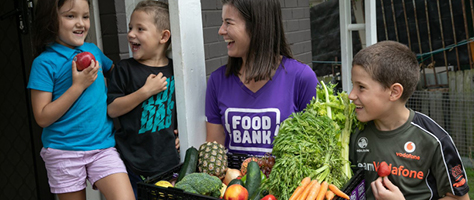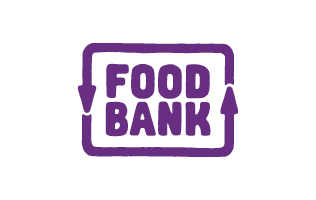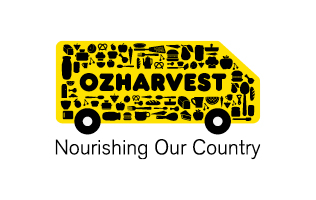Food Insecurity in Australia
The Australian Government’s Roadmap for reducing Australia's food waste by half by 2030, explains that, over seven million tonnes of food are wasted in Australia each year. Meanwhile, the Foodbank Hunger Report for 2024 reveals that low-income households continue to experience historically high levels of food insecurity.
It is a common misconception that food insecurity is limited to vulnerable groups such as people affected by homelessness and the unemployed. In reality, food insecurity affects people of every age, both in cities and regional or remote areas. There are many reasons why people become food insecure. Low income, payment of rent, or bill shock can cause food insecurity for individuals whether they live alone, in a family or in a share-house. You may be surprised to know that food insecurity affects more people who are in some form of employment than those who have none. To learn more about food insecurity, read 'The Facts' on the Foodbank website.
How ALDI is working with food rescue organisations to support Australians facing food insecurity

As a major Australian retailer, ALDI is committed to reducing food insecurity and giving surplus food to those who need it most.
We are working with food rescue organisations such as Foodbank and OzHarvest to do our part for the environment and support the community. Find out more below.
During 2023, we donated 11.8 million meals to people impacted by food insecurity through our Food Rescue Program with OzHarvest, Foodbank and local charities. Currently our stores and distribution centres are connected with over 340 local food rescue organisations. Where surplus food cannot be donated to food rescue organisations, we donate to our 160 connected farmers for use as animal feed.
To learn more about our amazing food rescue partners or to make food bank donations, visit their websites below. :
We support food rescue organisations
Want to participate in ALDI's Food Rescue Program?
Visit our Food Rescue page to find out more or learn how to become an ALDI Food Rescue Participant. If you are an existing Food Rescue Participant you can access program information, submit reporting or provide feedback via the Food Rescue page.
Together let’s minimise food insecurity
According to the Australian Institute of Family Studies*, the strategies required to address food insecurity for all Australians are many and varied. These include policy interventions; local level collaborations; emergency food relief initiatives; school-based programs and education.
According to Foodbank**, the amount of food that is wasted every year in Australia is costing our economy over $20 billion annually. Minimising food waste in the home positively impacts the environment and our economy.
Learn more about how you can make a difference and see some easy tips you can try next time you’re making dinner, on our Zero Waste at Home page.
*https://aifs.gov.au/resources/practice-guides/food-insecurity-australia-what-it-who-experiences-it-and-how-can-child
**https://www.foodbank.org.au/harvard-research-addresses-food-waste/?state=wa
Frequently Asked Questions
What is food insecurity?
The three key components of food insecurity are inadequate access to food, inadequate supply and the inappropriate preparation of food. Certain groups in Australia are more susceptible to food insecurity such as low income earners, single parent households and socially isolated people.
What is a food bank?
A food bank is a non-profit organisation that provides food to vulnerable people such as the homeless and those affected by natural disasters. Food banks aim to prevent hunger, usually through their own food pantry and donations from volunteers and partners.
What is food waste?
According to Foodbank, food waste includes all food intended for human consumption that either never reaches us or is thrown away by consumers. Perfectly edible produce is often dismissed if it does not meet optimal criteria such as colour, shape and size. Foods that are close to, at or beyond the “best-before” dates are often discarded – even though they are still within their “use-by” date. Large quantities of wholesome edible food are often unused or leftover and discarded from household kitchens and eating establishments.
For tips and information on how you can reduce food waste at home, check out our page Zero Waste at Home.
Why is food waste bad?
Food that is not eaten contributes to greenhouse gas emissions, sacrifices fresh water and the lives of millions of farm animals. Food waste also accounts for billions of dollars’ worth of human labour as well as pesticides that are purposelessly applied.
How do I become a Food Rescue Organisation for ALDI?
Visit our Food Rescue portal and select ‘I want to become an ALDI Food Rescue Participant'. Then follow the prompts.
You will be required to download, read and agree to our ALDI Participation Agreement and Guidelines and be required to upload a valid copy of your Public Liability insurance certificate.
Once your registration has been submitted it will be reviewed. If successful you will be connected to a store.
Why do I need to register to rescue food from ALDI stores?
It is important for ALDI to know who is collecting food surplus from our stores and that they have understood and agreed to the conditions outlined in our Agreement and Guidelines.
Please do not approach a store for food rescue activities without being assigned by the ALDI Food Rescue team. Registered organisations will also receive the latest important and helpful information in regards to food rescue activities.
I am an existing food rescue organisation with ALDI and I want to report an issue or give feedback - how do I do that?
Please visit our Food Rescue portal and select ‘I am an existing ALDI Food Rescue Participant’ followed by ‘I want to share some feedback regarding a store that I am connected to.'

